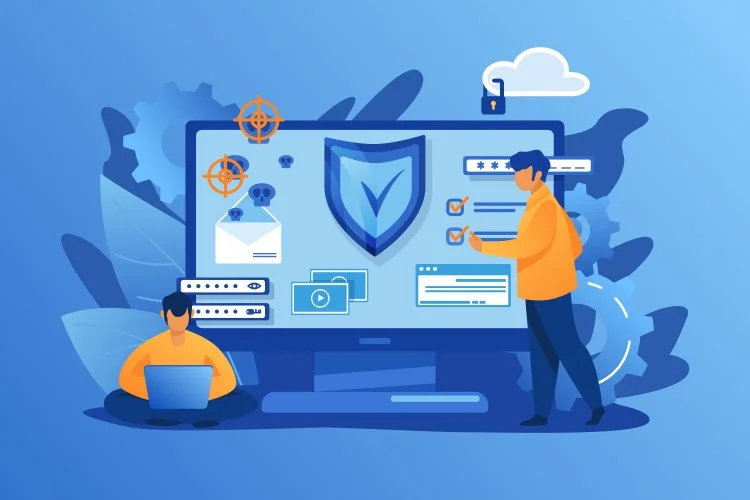Endpoint security solutions can play an integral role in protecting network devices; however, they're only one piece of a comprehensive security strategy.
Data breaches can be devastating for any organization, especially when employees use personal devices to access work data. Below are some strategies for keeping your enterprise secure: NGAV solutions such as xcitium.
Malware
Malware often compromises endpoint devices by encrypting files and searching the system for sensitive information to take. As a result, business owners must invest in cybersecurity that protects both their network and remote devices like smartphones, tablets and laptops from attack.
Endpoint protection software, hardware solutions and managed endpoint security services aim to secure the devices employees use to access a company's network and data, including work-from-home employees' personal smartphones and laptops as well as on-site computers - for smaller operations this could include one laptop or server while enterprise operations might involve thousands of connected endpoints.

An effective way of monitoring all devices within a network is through an advanced software solution such as a managed endpoint protection platform. These platforms offer a centralized dashboard that monitors security health of all devices connected to the network as well as detect and respond quickly to dynamic security incidents like zero-day attacks.
Endpoint protection platforms (EPPs) are platforms that combine antivirus, threat hunting, disk encryption and more for endpoint security. Antivirus is typically included as part of these EPPs; however, this alone won't protect against advanced threats that exploit system vulnerabilities or use stealthy tactics to bypass existing detection tools.
Viruses
Modern endpoint security solutions use both signature-based and behavioral analysis techniques to detect viruses. First, any potential threats' signature is checked against a list of known malware; if its signature matches, its program is blocked immediately - with few false positives reported by this method. Furthermore, an automated machine analyzes how each threat behaves; any that appear suspicious are blocked and quarantined immediately; even zero-day threats like ransomware can thus be stopped from spreading further.
Mobile device proliferation has compounded the challenge of endpoint security, particularly with BYOD policies and remote working arrangements allowing employees to work from home or on-the-go. Endpoint protection solutions provide solutions that protect these devices by ensuring all follow policies and cannot bypass security protocols.
Many security solutions have added features to help combat evolving cyber threats, like Trellix. For example, this platform combines traditional firewall, reputation, and heuristics capabilities with advanced malware prevention and detection for an unparalleled combination. Furthermore, its secure email gateway inspects each email to check for potential cyber threats, while it can sandbox individual user devices to isolate systems and restrict access to sensitive data while real-time alerting provides real-time alerts to security teams when threats have been identified.
Trojans
As hackers are continually finding new ways to gain entry to businesses' networks, steal data and induce employees into divulging sensitive information, endpoint security has become ever more crucial for businesses. A successful attack could disrupt company processes, harm their reputation or lead to costly compliance violations that require costly remedial action plans for remediation.
As BYOD and remote working policies become more commonplace, cybersecurity must extend beyond network boundaries. That is why endpoint protection platforms provide such valuable protection - they serve as a strong line of defense that can thwart attackers before they gain access to business-critical data.
Endpoint protection solutions must provide advanced detection capabilities in order to keep up with an ever-evolving threat landscape, which often means offering cloud solutions which offer scalability, easy deployment and rapid detection of threats. Such capabilities include anti-malware scanning, memory analysis and behavioral analytics which provides data on current attacks as well as behavioral characteristics of attackers that can help predict and stop unknown zero-day attacks.
Your organization's optimal solution will depend on the size and composition of its network and devices, as well as your device preferences. By installing the appropriate endpoint protection platform, you can gain full visibility over all on- and off-network devices (even mobile ones connecting via Wi-Fi),protecting them from cyber attacks while saving both time and money by automating manual processes.
Ransomware
Cyber attacks pose one of the greatest threats to any organization, posing an ever-increasing risk that threatens data loss and could have serious repercussions, from reputation damage to financial losses and even a shutdown. A strong endpoint security plan should therefore be established at businesses of all sizes to safeguard vital business data and prevent cyber breaches from taking place.
Anti-malware software is one of the primary means of protecting endpoints, identifying malicious files and alerting the IT team while quarantining devices or software that contain them and blocking access on other endpoints. Anti-malware can play an essential role in endpoint security solutions but will only be effective if combined with features like EDR.
EDR technology continuously monitors an endpoint for signs of malware or ransomware infection, can identify suspicious behavior patterns on the machine and flag them for manual review, detect lateral movement between devices to stop malware spreading and more. EDR should be considered when searching for endpoint security solutions, as it provides protection from attacks that bypass other forms of defense. EDR works best when used alongside other security measures such as firewalls, antivirus and heuristics. Big data and predictive analytics have proven their worth across numerous industries - now even in cybersecurity solutions! They allow companies to analyze attacker behavior as well as predict attacks before they occur and stop potential issues before they arise.
Exploits
Endpoint security solutions are designed to identify and block cyber threats before they pose a danger to your business. While traditional antivirus tools only scan for malware signatures, modern endpoint protection uses advanced algorithms that analyze user behavior on devices in search of suspicious activity - making it possible to detect ransomware attacks that have yet to make their way into virus and worm databases.
Modern endpoint protection software can encrypt files on devices to make it impossible for hackers to read them even if they gain entry. Furthermore, modern solutions utilize sandboxing technology to run applications in virtual environments on these machines, restricting access to sensitive information while providing employees the ability to work remotely without creating additional vulnerabilities for hackers to exploit.
Though there are different types of endpoint security solutions available, cloud-based ones offer several distinct advantages over their rivals. Not only are they easier and faster for IT teams to maintain locally hosted databases of threats; as your business expands they also become scalable more rapidly.
Modern, advanced endpoint security solutions should include EDR (endpoint detection and response). EDR systems monitor endpoints continuously with sophisticated algorithms analyzing user behaviors to detect any signs of compromise in minutes - providing your IT team with a detailed list of indicators of compromise directly from each endpoint.
Detection
Given the rise of work from home and smartphone usage, traditional endpoint protection software often fails to effectively secure networks. This is because most threats that threaten an organization remain unknown while traditional security relies on databases of known malware for detection purposes. Hackers are constantly adapting their malware in order to evade detection by IT professionals and antivirus software programs. Attackers can quickly change a file's hash so it no longer matches what antivirus programs look for; IT professionals also often struggle with keeping up-to-date antimalware software so as to detect changes quickly enough.
Endpoint protection is crucial for businesses. It ensures all devices in an organization remain up-to-date and secure, which reduces the chance that one device becomes an attack vector and protects critical data in case of an attack.
Most modern endpoint protection solutions rely on machine learning to detect and prevent attacks that are unknown to them. By gathering big data from current and previous attacks, these endpoint security solutions can predict how an attack might progress and take proactive measures to stop it before it happens - leading to faster detection, fewer threats, less downtime for business operations and saving IT staff time so they can focus on projects that increase the company's bottom line.
